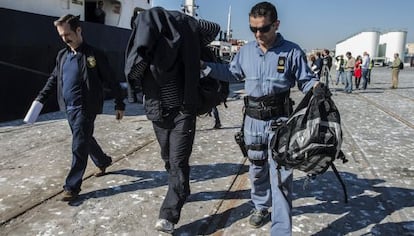Universal justice reform could see dozens more drug traffickers set free
Eight arrested near Málaga may benefit from move to curtail courts’ ability to try foreign crimes

In computer programming, a bug is a coding error that triggers undesired results. The fast-track reform of Spain's universal justice doctrine, rammed through by the ruling Popular Party (PP) to curtail judges’ abilities to try crimes against humanity, contains such a bug, and the first serious error has already occurred: the release of eight Egyptian drug traffickers who had been arrested in international waters south of Almería by Spanish authorities. The vessel, which flew no flag, contained 10 tons of hashish.
Legal sources say that the Egyptian drug traffickers will probably not be the only alleged criminals to be released following the legislative changes, and that dozens of foreign drug smugglers arrested by Spain in international waters near its shores will likely also be set free.
The reason for the urgency in reforming the law was the pressure from countries such as China, which was angry at a Spanish judge’s decision to issue international arrest warrants against former Communist Party leaders over the genocide in Tibet. Until now, Spanish courts have been applying the principle of universal justice to try foreigners for crimes committed outside of national borders. Individuals who have been put on trial and convicted in Spain under the doctrine include Adolfo Scilingo, a naval officer under the Argentinean dictatorship in the late 1970s.
Among the other alleged traffickers who might now be released are the eight sailors aboard the Mayak, a cargo ship registered in Sierra Leone that was stopped by Spanish, Italian and French customs authorities 30 miles off the bay of Málaga, in international waters. Aboard the vessel were 12 tons of hashish. The seizure and arrests took place the day after the legal reforms went into effect, making it likely that High Court judge Javier Gómez Bermúdez will have to order their release.
Since June 2013, Spanish customs officials have intercepted five other such ships, which load their drugs in international waters near the Moroccan coast, then transport their cargo to Spain, France, Portugal and other countries.
Tu suscripción se está usando en otro dispositivo
¿Quieres añadir otro usuario a tu suscripción?
Si continúas leyendo en este dispositivo, no se podrá leer en el otro.
FlechaTu suscripción se está usando en otro dispositivo y solo puedes acceder a EL PAÍS desde un dispositivo a la vez.
Si quieres compartir tu cuenta, cambia tu suscripción a la modalidad Premium, así podrás añadir otro usuario. Cada uno accederá con su propia cuenta de email, lo que os permitirá personalizar vuestra experiencia en EL PAÍS.
En el caso de no saber quién está usando tu cuenta, te recomendamos cambiar tu contraseña aquí.
Si decides continuar compartiendo tu cuenta, este mensaje se mostrará en tu dispositivo y en el de la otra persona que está usando tu cuenta de forma indefinida, afectando a tu experiencia de lectura. Puedes consultar aquí los términos y condiciones de la suscripción digital.








































